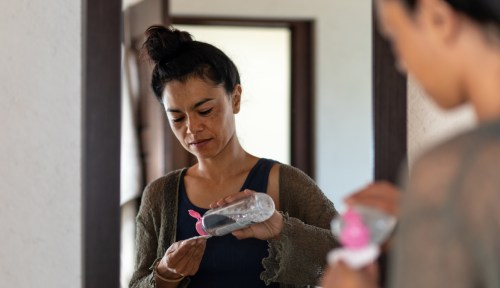Our editors independently select these products. Making a purchase through our links may earn Well+Good a commission
French Women Swear By Washing Their Faces With Micellar Water, so I Ditched My Cleanser for 2 Weeks To See if It Actually Works
I ditched my traditional cleanser and use micellar water as face wash for two weeks—here's what happened to my skin.

It takes a brave soul to experiment with a set skin-care regimen. When you have a routine that works for you, you might not want to deviate from it—lest you start breaking out in acne or dry patches. But as a beauty writer, skin-care experimentation is part of my job description, and my most recent experiment involved replacing my cleanser with micellar water every time I washed my face.
You see, I was on a two-week, three-city tour of Mexico and realized I had forgotten my cleanser. I did, however, have some micellar water on hand, so I decided to… just use that for the remainder of my trip. Considering French women swear by washing their faces with the stuff, I figured there had to be something to it. So I threw caution (and cleanser) to the wind to see how my skin would respond.
What is micellar water?
“Micellar water is typically a combination of purified water, hydrating ingredients, and low concentrations of extremely mild surfactants,” says licensed esthetician Dihan FC, founder of Skin by DihanFC. “The molecules of those mild surfactants naturally group together to form microscopic spheres called micelles. These micelles will act like magnets for dirt and oil.”
Put another way, micellar water works to remove dirt and oil from your face. But skin-care experts generally don’t recommend the liquid as a replacement for your cleanser.
“Though micellar water delivers hydration while cleansing, it should not be used as a standalone cleanser,” says melanated skincare expert and board-certified dermatologist Simran Sethi, MD. “It is better suited to be a makeup cleanser that should be followed by a more exfoliating cleanser containing an AHA or BHA.”
Skin-care experts’ predictions for replacing my cleanser with micellar water
With that in mind, I was expecting the experts to all but write me off as unwell for deciding to undergo this experiment. But neither Dr. Sethi or FC were really all that concerned, because micellar water does offer some pretty stellar cleansing properties—especially for people with sensitive skin.
This Parisian Skincare Brand Is Launching in the United States for the First Time—Here’s What a Derm Wants You to Know

We’re Calling It: Cleansing Balms Are the Face Wash of the Future—Here Are 3 to Add to Your Cart

This Is the One Product That Scarlett Johansson Always Keeps in Her Purse and on Her Bedside Table

“The formulas [for micellar waters] are typically light and gentle, which helps those who may be experiencing sensitized skin,” says FC. “They can be a great option for those with compromised barriers, who may need the mildest of cleansing options—and even for those who have chronic skin conditions like eczema and psoriasis.” She adds that because most micellar waters don’t need to be rinsed off, they can aid in protecting the skin barrier without drying out the dermis.
Dihan and Dr. Sethi weren’t super confident in my experiment. The latter predicted that my skin would “feel smooth for the first week,” but after that, I “may start developing some whiteheads or small breakouts, especially in areas like around the nose or chin.”
Surprise surprise—she was spot on.
What happened to my skin when I replaced my cleanser with micellar water
During my micellar water experiment, I tried out a few different application processes. Sometimes I would dampen a washcloth with micellar water, use it to wipe my face, and then rinse everything off. Other times, I would ditch the washcloth and use the liquid in the shower the same way I would a standard cleanser (a good ol’ lather and rinse) but didn’t love the way that worked, so I stuck with the washcloth method most days.
In the beginning, my skin still felt clean—I wasn’t breaking out, and my complexion didn’t look any duller or drier than it had before the experiment started. For the first week, I was pleasantly surprised by the results, and appreciated that it didn’t feel like I was layering other products (serum, moisturizer, etc.) on top of dirty skin.
As I traveled throughout Mexico, though, I found myself on a lot of buses, planes, and car rides—which meant that my skin was constantly exposed to reused air. It wasn’t long until I started seeing the effects in the form of dryness, dullness, and a pimple on my nose… and I really started missing my cleanser.
This, of course, is exactly what Dr. Sethi said would happen. “Debris can get deposited deep into pores and we need ingredients that can unglue that debris and effectively clean out the pores,” she says. “I am not surprised by your results because I have met quite a few patients who depend on micellar water to wash their face but then start breaking out or even notice that their complexion appears dull,” Dr. Sethi says.
So while micellar water is great for gently removing makeup, it doesn’t quite work hard enough to give pores the deep clean they need to stay clear of dirt and grime—you need an actual cleanser for that, and now I understand why.
When my face wash and I were reunited at the end of two weeks, I remembered what I’d been missing. While I’ll keep my micellar water on hand to use as the first step of a double cleanse, it likely won’t be the solo star of the show ever again—unless I find myself hundreds of miles away from home without another option.
Sign Up for Our Daily Newsletter
Get all the latest in wellness, trends, food, fitness, beauty, and more delivered right to your inbox.
Got it, you've been added to our email list.







